- Home
- Taylor Jenkins Reid
Daisy Jones & the Six Page 12
Daisy Jones & the Six Read online
Page 12
KAREN: “Or Billy’s,” she goes. I looked right to Billy to see his reaction. He was sipping a soda out of a beer stein.
BILLY: I thought, Why does she need to start trouble already?
DAISY: I said, “You all brought me on because when we work together, we make better music than what we do apart. So I want a say in what music we’re putting out. I want to write this album with you, Billy.”
Teddy had told me I could write my second album and this felt like that chance. And I wanted to be clear out of the gate, that’s what I was chasing. I wanted to stand up in front of a crowd, like I had that night singing “When You Fly Low” a cappella. I wanted to sing songs from my heart right to the people in front of me.
If The Six didn’t want me for that, I didn’t want whatever second prize they were offering.
GRAHAM: Daisy didn’t want Billy throwing a temper tantrum every time she tried to contribute something of her own. She was laying down the law early. Probably the way the rest of us should have from the beginning. If we wanted any sort of meaningful say.
Certainly if Eddie had half of Daisy’s balls, he would have solved his issues with Billy like that years ago.
BILLY: I said, “That’s fine, Daisy. We’re all in this together.”
WARREN: I didn’t bother getting riled up about it because what was the point? But Billy was acting like this was one big hippie commune where everyone had a say. And that was a lie.
KAREN: Billy did have a way of making you think you were crazy for even thinking things were unfair when, in fact, they were completely unfair. He wasn’t even aware of the way everyone revolved around him.
ROD: The Chosen ones never know they are chosen. They think everyone gets a gold carpet rolled out for them.
GRAHAM: Pete chimed in at one point and said, “While this is all out on the table, I’m taking full control over my own bass lines from here on out.”
BILLY: I told Pete I was fine with him writing his bass lines. He’d been writing most of his bass lines for a while.
KAREN: I said, “I’d like to step it up a bit. I think we can use me more often to round out songs. Maybe even do a song just keys and vocals.”
EDDIE: I wanted a say in what I was playing. Everyone’s chiming in like Billy’s trying to control them—and he did. But he was really controlling me. I said, “I write my own riffs from here on out.”
BILLY: I just kept thinking, Of course Eddie’s throwing a fit. I started to say something and Teddy put his hand out, kind of gave me a look like Don’t talk right now. Just hear them out.
Teddy and I both knew that some people needed to feel heard whether or not you actually listened to them.
EDDIE: Look, I really liked Daisy. And I liked Karen, I wanted her to be able to contribute more. But a female vocalist on the whole album and more keys? Karen’s keys were softening us too much as it was, if you asked me.
I said, “I want to make sure we’re still a rock band.”
Graham said, “What do you mean?”
I said, “I don’t want to be in a pop band. This isn’t Sonny & Cher over here.” Billy bristled at that.
BILLY: I was just getting shit on all night. I’m thinking, What did I ever do to you people except take us this far?
GRAHAM: I thought Eddie’s point was well made. How was our music going to change with Daisy coming in? Especially if she was writing. But, of course, Billy felt like it was just people attacking him.
When you have everything, someone else getting a little something feels like they’re stealing from you.
KAREN: Everything that was happening, it was all really undefined. Was Daisy a permanent part of The Six? I didn’t know. I know Daisy didn’t know. I don’t even think Billy knew.
DAISY: I had been mulling this over for a while, of how the billing would work and what I felt I deserved.
I said, “If you all will commit to this and you want me to join as a member of The Six, then I’ll be a member of The Six. My name doesn’t need to be featured. But if it’s temporary, then we need to discuss some other type of billing.”
GRAHAM: You could just tell that Daisy was expecting us to say she was a member of The Six.
KAREN: Billy said, “How about The Six featuring Daisy Jones?”
ROD: That’s how “Honeycomb” was billed. So I understood what Billy was trying to do.
DAISY: I thought, Wow, okay, he didn’t even give it a second thought.
BILLY: She gave me two options. If she didn’t want me to have two options, she shouldn’t have given two options.
WARREN: I just thought, Let the girl join the band, man.
ROD: Teddy could see that things were headed in a tense direction. He had tried to keep quiet most of the discussion but he finally piped in and said, “You’ll be Daisy Jones & The Six.” And no one was happy but everyone was kind of equally dissatisfied.
DAISY: I think Teddy wanted to make sure my name was prominent. I brought attention to the band. My name needed to be front and center.
BILLY: Teddy was trying to protect the sanctity of The Six. We didn’t want to promise anything to Daisy.
DAISY: I don’t think Billy actually resented anything I asked for. All of it was reasonable. He was just pissed because I knew how much power I had and he would have preferred I either not know it or not use it. I am sorry but that is not my style. I mean, it shouldn’t be anybody’s, really.
Billy had been riding a bit too comfortable on the fact that everybody let him do what he wanted. And I was the first person to say, “You’re only in charge of me as much as I’m in charge of you.” And that opened the floodgates for Pete and Eddie and, well, everybody.
ROD: Teddy told the band that Runner wanted the album toward the top of ’seventy-eight. It was already August. Creative differences and ego checks and all of that aside, it was back to the salt mines.
KAREN: After we walked out of there that night, I thought, Holy shit. Daisy had just joined our band with top billing and fundamentally changed the dynamics of the group in a way that none of us had done before.
BILLY: Everyone always acted like I was such a difficult guy. But Daisy asked for an equal say and billing and I gave her both. What more did she want?
I mean, I wasn’t even sure it was the right thing to do. But I did it to keep her happy, to keep everybody happy.
GRAHAM: We became a democracy instead of an autocracy. And democracy sounds like a great idea, but bands aren’t countries.
BILLY: To be honest, I thought Daisy’d get tired of trying to write an album pretty quickly. I underestimated her.
Let me tell you this. Don’t ever doubt Daisy Jones.
In August 1977, the seven members of the band entered Wally Heider’s Studio 3 to begin the process of recording their third album.
GRAHAM: Karen and I left her place that morning, heading over to Heider. I said to her, just as we walked out of the door, “Can’t we just drive over together?”
She said she didn’t want people thinking we were sleeping together.
I said, “But we are sleeping together.”
She still made us take two cars.
KAREN: You know how easy it is to screw up your entire life by sleeping with somebody in your own band?
EDDIE: Pete and I drove over that morning. By that point, I think he and I were the only two still staying at the place in Topanga Canyon. Before he’d gotten back from the East Coast, I’d had the place all to myself.
I said to Pete on the way there, I said, “This should be interesting.”
And he told me to not take it all so seriously. He said, “It’s just rock ’n’ roll. None of this really matters.”
DAISY: When we all met up at the studio that first day, I brought this basket of cakes that someone had sent over to my place at the Marmont and my notebook full
of songs. I was ready.
EDDIE: Daisy showed up in a thin tank top and these tiny cutoff shorts. Barely covered anything.
DAISY: I run hot and I always have. I am not going to sit around sweating my ass off just so men can feel more comfortable. It’s not my responsibility to not turn them on. It’s their responsibility to not be an asshole.
BILLY: I had written about ten or twelve songs so far. All of them in great shape. But I knew I couldn’t go in there and tell them that I’d written the album already. Like I did with the other two albums. I couldn’t say that.
GRAHAM: It was kind of funny, to be honest. Watching Billy put on this act like he gave a shit what anyone else wanted on the album. God bless him. You could see the effort he was putting in. Talking all slow, thinking about his words.
DAISY: We were sitting around and I handed over my notebook. I said, “I’ve got a lot of good stuff in here to start from.” I thought maybe everyone could read it all and we could discuss it from there.
BILLY: Here I am, holding back my twelve great songs, so that no one thinks I’m trying to control things, and Daisy’s just walking into a band she’s brand new to, expecting everyone to read a whole journal of ideas.
DAISY: He didn’t even flip through it.
BILLY: If Daisy and I were going to write an album together, it needed to be just the two of us. You can’t give seven people a say in the words. Somebody had to take charge and control the process.
So I said, “Look, I wrote this song ‘Aurora.’ It’s the one I really believe in out of everything I’m working on for this album. The rest is up to us all. Daisy and I will write some songs and everyone will take a crack at the arrangements and once we’ve got a slate of great songs that we all love, we’ll narrow it down to the best of the best.”
KAREN: Maybe it’s revisionist history, but I think when Billy played “Aurora” it felt clear that we could build an album around it.
GRAHAM: We were all on board with “Aurora” as a great place to start—it was a great frickin’ song. After that, Daisy started talking about ideas for the album as a whole.
WARREN: I wanted no part in writing. That morning felt like a waste of my time. Everyone’s sitting around, talking about shit I don’t care about. I finally just said, “Don’t you all think that Daisy and Billy should go write the songs and come to us when they have them?”
KAREN: Teddy was really decisive about it. He handed Billy the keys to his guesthouse and said, “You two pop on over to my place, set up in my guesthouse, and get to writing. Everyone else is going to get to work on this new one.”
EDDIE: Billy didn’t want us composing anything for that song without him. But he also didn’t want Daisy writing songs without him. So he had to choose whether he went with Daisy and got started writing or stayed with us and worked on the arrangement for his new song.
And he chose Daisy.
BILLY: I got to Teddy’s pool house first and so I got settled. Made myself a cup of coffee, sat down, looked through my notes trying to decide what to show Daisy.
DAISY: By the time I opened the door, Billy’s already there, he’s got his notebook out to show me. Not so much as a hello. Just “Here, read my stuff.”
BILLY: I told her the truth, I said, “I’ve got a lot of the album written already. Do you want to take a look at it and see where we can make adjustments together? See if maybe there’s some gaps that we can fill in with some new stuff or the stuff you’ve written already?”
DAISY: I shouldn’t have been surprised. It was never gonna be easy with him, was it? I think I grabbed one of the bottles of wine I saw on Teddy’s counter and I opened it up and flopped myself down on the sofa and just started drinking it. I said, “Billy, that’s great that you’ve written a bunch of songs already. I have, too. But we’re writing this album together.”
BILLY: The woman is drinking warm white wine before it’s even noon and trying to lecture me on how things should go. She hadn’t even read my songs yet. I handed my work over to her and I said, “Read it first before you go telling me I should throw it away.”
DAISY: I said, “Ditto then.” And I shoved my notebook in his face. I could tell he didn’t want to read it. But he knew he had to.
BILLY: I read her stuff, and it wasn’t bad, but I thought it wasn’t The Six. She used so many biblical metaphors. So when she asked me what I thought, I told her that. I said, “We should start with my stuff as the backbone. We can refine it together.”
Daisy was sitting on the sofa with her feet up on the coffee table, which irked me. And then she said, “I’m not singing an entire album about your wife, Billy.”
DAISY: I really liked Camila. But “Señora” was about her. “Honeycomb” was about her. “Aurora” was about her. It was boring.
BILLY: I said, “You’re writing the same song, too. We both know every song in this book is about the same thing.” Well, that got her upset. She put her hands on her hips and said, “What is that supposed to mean?”
And I said, “Every single one of these songs is about the pills in your pockets.”
DAISY: Billy got this smug look on his face—Billy had this face that he would make when he thought he was smarter than everyone in the room. I swear, I have nightmares still about that goddamn face. I said to him, “You just think everybody’s writing about dope ’cause you can’t have any.”
And he said, “You just go ahead and keep popping pills and writing songs about it. See where that gets you.”
I tossed his pages at him. I said, “Sorry we all can’t be sober and writing songs as interesting as wallpaper paste. Oh, here’s a song about how much I love my wife. And another! And another!”
He tried to tell me I was wrong but I said, “This whole pack of songs is about Camila. You can’t keep writing apology songs to your wife and making the band play them.”
BILLY: So out of line.
DAISY: I said, “Good for you for finding some other shit to be addicted to. But it’s not my problem and it’s not the band’s problem and nobody wants to listen to it.” You could see it on his face. That he knew I was right.
BILLY: She thought she was brilliant because she’d realized that I’d replaced my addictions. Like I didn’t already know that I clung to my love for my family to keep me sober. That just made me even more mad, that she thought she knew more about me than me.
I said, “You want to know your problem? You think you’re a poet but other than talking about getting high, you don’t have anything to say.”
DAISY: Billy’s one of those people who has a sharp tongue. He can build you up and he can take you down, too.
BILLY: She said, “I don’t need this shit.” And she left.
DAISY: I started heading out to my car—getting more rip-roaring angry with every step I took. I had a cherry red Benz back then. I loved that car. Until I crashed it by accident by leaving it in neutral on a hill.
Anyway, that day with Billy, I was headed out to that Benz and I had my keys in my hand and I’m ready to get as far away from him as I can and I realize that if I leave, Billy would just write the album himself. And I turned right back around and I said, “Oh, no you don’t, asshole.”
BILLY: I was really surprised that she came back.
DAISY: I walked right into the pool house and I sat down on the couch and I said, “I’m not giving up my chance to write a great album just because of you. So here’s how it’s gonna go. You hate my stuff, I hate your stuff. So we’ll scrap it all, start from nothing.”
Billy said, “I’m not letting go of ‘Aurora.’ It’s going on the album.”
I said, “Fine.” And then I picked up one of his songs lying around where I’d thrown them and I shook it at him and I said, “But this shit isn’t.”
BILLY: I think that was the first time I realized that there’s…There is no one more
passionate about the work than Daisy. Daisy cared more than anybody. She was ready to put her whole soul into it. Regardless of how difficult I tried to make it.
And I kept thinking about Teddy telling me she was how we were going to sell out stadiums. So I put out my hand and I said, “Fine.” And we shook on it.
DAISY: Simone used to say that drugs make a person look old, but when I was shaking Billy’s hand—his eyes were already wrinkling at the corners, his skin was freckled, he looked weathered, and he couldn’t have been more than twenty-nine or thirty. I thought, It’s not drugs that make you look old, it’s sobering up.
BILLY: It wasn’t very easy, thinking about writing together when we’d said what we’d said to each other.
DAISY: I told Billy I wanted to get lunch before we did much of anything. I wasn’t going to deal with the headache of trying to write with him before I had a burger. I told him I’d drive us to the Apple Pan.
BILLY: I grabbed her keys just as she was about to get in her car and I told her I wasn’t letting her drive anywhere. She was half in the bag already.
DAISY: I grabbed my keys back and told him if he wanted to drive, we could take his car.
BILLY: We got into my Firebird and I said, “Let’s go to El Carmen. It’s closer.”
And she said, “I’m going to the Apple Pan. You can go to El Carmen by yourself.”
I just could not believe she was being so goddamn difficult.
DAISY: I used to care when men called me difficult. I really did. Then I stopped. This way is better.
BILLY: On the way there, I turned on the radio. Immediately, Daisy changed the station. I changed it back. She changed it again. I said, “It’s my car, for crying out loud.”
She said, “Well, they’re my ears.”
I finally put in an 8-track of the Breeze. I put on their song “Tiny Love.” Daisy started laughing.
I said, “What’s so funny?”
She said, “You like this song?”
Why would I put on a song I didn’t like?

 Daisy Jones & the Six
Daisy Jones & the Six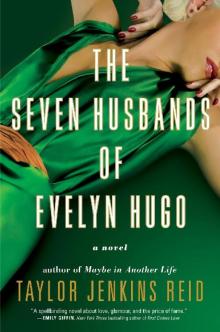 The Seven Husbands of Evelyn Hugo
The Seven Husbands of Evelyn Hugo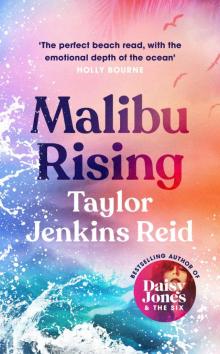 Malibu Rising
Malibu Rising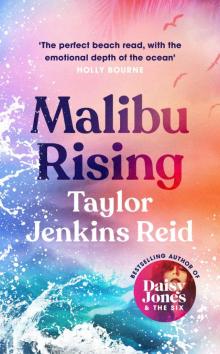 Malibu Rising: A Novel
Malibu Rising: A Novel After I Do
After I Do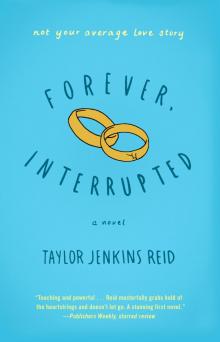 Forever, Interrupted
Forever, Interrupted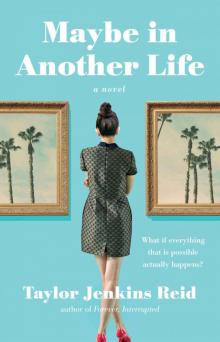 Maybe in Another Life
Maybe in Another Life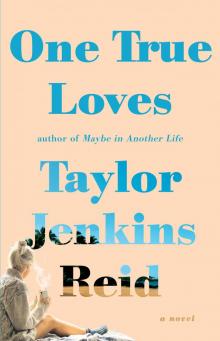 One True Loves
One True Loves